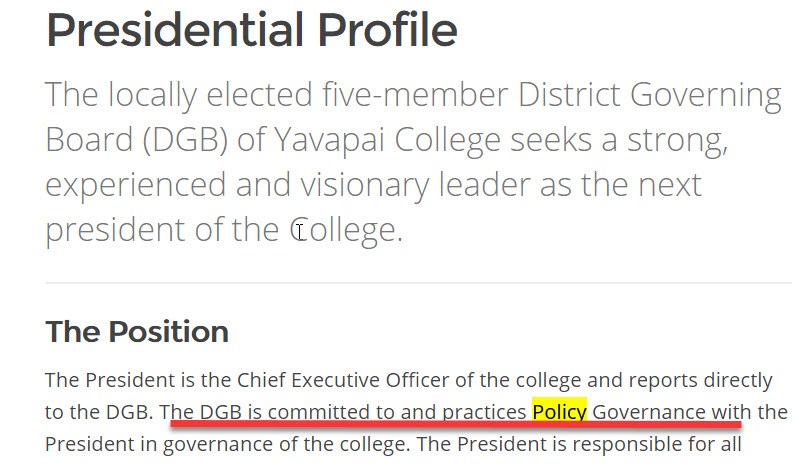Despite repeated criticism from East side representatives over the past several years, Yavapai Community College wants to continue a policy governance program that hides responsibility and accountability from public; statement in draft profile erroneously anticipates how new January Governing Board will function
 The draft profile for the next Yavapai Community College president is now posted online (See it in full by clicking here.) The most controversial language in it refers to retaining the awful Carver Policy Governance policies. These are policies that were designed for large corporations; not for public universities and colleges. And certainly not for Yavapai College where its direction comes from five elected officials.
The draft profile for the next Yavapai Community College president is now posted online (See it in full by clicking here.) The most controversial language in it refers to retaining the awful Carver Policy Governance policies. These are policies that were designed for large corporations; not for public universities and colleges. And certainly not for Yavapai College where its direction comes from five elected officials.
The College administration loves the policy governance model because it allows the President and his or her executives to easily hide or obfuscate important information about College programs and capital development from the public and the Governing Board. It prevents the Board from setting simple, straight-forward goals such as increasing enrollment by 5% in two years. Or, creating a specific capital and programming vision for the Verde Campus for the next five years.
The current policy governance model has been criticized by former Governing Board members Al Filardo and Bob Oliphant. Current second district representative Deb McCasland has repeatedly publicly pointed out since she was elected how the policy governance model as applied at Yavapai College hides information from the Board and the public.
Despite the enormous amount of criticism, the draft says the “DBG is committed to and practices Policy Governance.” The statement is false in the sense that the District Governing Board can drop the practice and is almost certain to do so if new members are elected to the Governing Board in November of this year.


